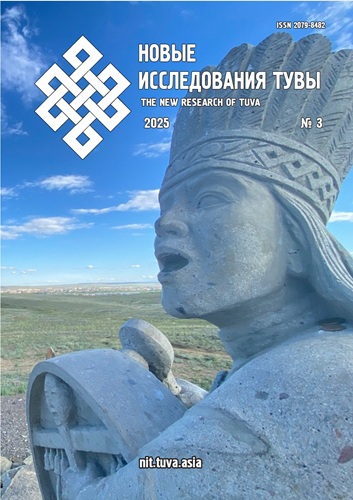Thesis, Antithesis, and Synthesis in Olzhas Suleimenov’s Conception in Kazakhstani Historical Documentary Cinema of the 1960s
DOI:
https://doi.org/10.25178/nit.2025.3.23Keywords:
post-nomadic culture; historical memory; subjectivity; documentary cinema; visual anthropology; Olzhas Suleimenov; Kazakhstan; 1960s; cultural trauma; KazakhsAbstract
This article examines the role of Kazakhstani documentary cinema of the 1960s in the historical process of overcoming cultural traumas and ruptures within post-nomadic Kazakh culture under the conditions of the Soviet state. The authors raise questions concerning the boundaries of historical memory and the subjectivity of Kazakh culture in the latter half of the twentieth century.
The analysis focuses on three key documentary films produced by the “Kazakhfilm” studio in the 1960s under the leadership and intellectual influence of the poet Olzhas Suleimenov. The authors emphasize that, within the constraints of Soviet censorship, the filmmakers skillfully adapted existing ideological canons, employing visual and poetic language as instruments of cultural self-reflection. The three films under consideration are positioned relative to each other and to the historical context of the era according to a Hegelian triad: thesis — antithesis — synthesis. The logic of the films is structured as a progression from local dichotomies to universal cultural narratives, transcending imposed cultural hierarchies through dialogue with them.
In the film “According to the law of preservation of thoughts” (1966), Suleimenov explores the theme of cultural heritage in the medieval cities of Central Asia and the problem of cultural ruptures. The film “The History of the Cow Sign” (1968) overcomes local historical and cultural dichotomies, investigating the origins of human culture. In the third film “Memory of the Earth” (1970), reflections on ethnocultural cleavages of Kazakh history and the World heritage are integrated in the context of contemporary peoples’ quest for historical subjectivity.
The article highlights the heuristic potential of narratives produced by the creative intelligentsia of Soviet Kazakhstan, as realized in historical documentary filmmaking.
References
Abashin, S. N. (2015) The Soviet Kishlak: Between Colonialism and Modernization. Moscow, Novoe literaturnoe obozrenie. 848 p. (In Russ.)
Abikeeva, G. and Sabitov, A. (2020) Cinema of Soviet Kazakhstan: How Soviet Ideologemes Worked. Acta Slavica Iaponica, vol. 41, pp. 47–72. (In Russ.)
Abylkhozhin, Zh. B. (2022) Essays on the History of the Traditional Structure of the Kazakhs in the First Soviet Decades: Cultural and Socio-Economic Aspects. Almaty, LEM. 300 p. (In Russ.)
Abylkhozhin, Zh. B. and Krupko, I. V. (2022) Historical Plots and Images of the Gaining of National and All-Union Kazakh Subjectivity in 1950s–1960s Cinema. Vestnik Kazakhskogo Natsional’nogo universiteta. Seriya “Istoricheskie i sotsial’no-politicheskie nauki”, no. 2 (73), pp. 217–223. (In Russ.) DOI: https://doi.org/10.51889/2022-2.1728-5461.21
Abylkhozhin, Zh. B. and Krupko, I. V. (2024) Ideological Debates and the Search for the Historical Subjectivity of Kazakhstani Society in the Twentieth Century. New Research of Tuva, no. 3, pp. 265–278. (In Russ.) DOI: https://doi.org/10.25178/nit.2024.3.15
Akishev, K. A. (1978) The Issyk Kurgan: The Art of the Saka of Kazakhstan. Moscow, Iskusstvo. 132 p. (In Russ.)
Akishev, A. K. (1984) Art and Mythology of the Saka. Alma-Ata, Nauka. 176 p. (In Russ.)
Akishev, K. A. and Ageeva, E. I. (1958) Ancient Monuments of Kazakhstan. Alma-Ata, Kazakh State Publishing House. 60 p. (In Russ.)
Akishev, K. A., Erzakovich, L. B. and Baipakov, K. M. (1972) Ancient Otrar (Topography, Stratigraphy, Prospects). Alma-Ata, Nauka. 214 p. (In Russ.)
Asfendiarov, S. (1930) Islam and Nomadic Economy. Ateist, no. 58, pp. 3–18. (In Russ.)
Auezov, M. M. (1993) Nomads. Aesthetics: Understanding the World Through Traditional Kazakh Art. Almaty, Gylym, 264 p. (In Russ.)
Baipakov, K. M. (2014) On the History of the Study of the Archaeological and Cultural Heritage of Otrar, the Otrar Oasis, and Kazakhstan. In: Materials of the International Scientific and Practical Conference Dedicated to the 40th Anniversary of the South Kazakhstan Integrated Archaeological Expedition, ed. O. V. Kuznetsova. Almaty, s. n. 306 p. Pp. 8–14. (In Russ.)
Bustanov, A. (2017) Between Nation and Artifact: Oriental Archaeology in Soviet Kazakhstan. In: Muslims in the New Imperial History: Collected Articles, ed. and comp. by V. O. Bobrovnikov et al. Moscow, OOO “Sadra”. 424 p. Pp. 76–98. (In Russ.)
Hegel, G. V. (1997) Science of Logic. St. Petersburg, Nauka. 800 p. (In Russ.)
Dzhangazina, M. (2021) Cinema as a Cultural Factor in History. Shaken Aimanov, ‘Homeland of Fathers’ (‘Atameken’). Vestnik KazNPU imeni Abaya. Seriya “Istoricheskie i sotsial’no-politicheskie nauki”, vol. 2, no. 69 (In Russ.) DOI: https://doi.org/10.51889/2021-2.1728-5461.06
Erekesheva, L. G. (2024) Intellectual Discourse on Nation-Building: Nationalism and Historical Understanding in India. New Research of Tuva, no. 4, pp. 310–324. (In Russ.) DOI: https://doi.org/10.25178/nit.2024.4.20
Kairbekov, B. G. (2025) ‘I Seek the Heart of Every Word’: The Poetics of Olzhas Suleimenov. Moscow, Almavest. 104 p. (In Russ.)
Korenevskii, A. V. (2014) The Evolution of the ‘Civilizational Paradigm’ in the Works of Spengler, Toynbee, Huntington: Thesis, Antithesis, Synthesis. Nauchnaya mysl’ Kavkaza, no. 3 (79), pp. 35–44. (In Russ.)
Kradin, N. I. and Bondarenko, D. M. (2002) The Nomadic Alternative to Social Evolution. Moscow, Institut Afriki RAN. 201 p. (In Russ.)
Krasnopol’skaya, Ya. V. (2018) Main Archetypal Images in Kazakh Cinema of the Soviet Period. Aktual’nye nauchnye issledovaniya v sovremennom mire, no. 5–7, pp. 87–93. (In Russ.)
Krupko, I. V. (2022) The Semiosis of Image and Narrative in Otrar’s Library: In Search of Lost Enlightenment. Elektronnyi nauchnyi zhurnal “edu.e-history.kz”, vol. 9, no. 3, pp. 112–125. (In Russ.) DOI: https://doi.org/10.51943/2710-3994
Krupko, I. V. (2023) The Reinvention of Kazakh Historical Subjectivity in the Creative Work of Olzhas Suleimenov in the 1960s. Ural’skii istoricheskii vestnik, no. 1 (78), pp. 123–132. (In Russ.) DOI: https://doi.org/10.30759/1728-9718-2023-1(78)-123-132
Lidzheeva, I. V. (2023) ‘Accustoming to Sedentism’: Imperial Policy in Alien Territories. Kaspiiskii region: politika, ekonomika, kul’tura, no. 2 (75), pp. 11–20. (In Russ.)
Manichkin, N. A. (2023) Interdependent Formation: Poetic Reinterpretation of Symbols and Images of Historical Memory in Kazakhstan. Elektronnyi nauchnyi zhurnal “edu.e-history.kz”, vol. 10, no. 2, pp. 334–346. (In Russ.) DOI: https://doi.org/10.51943/2710-3994_2023_34_2_334-346
Manichkin, N. A. (2024) Folk Ornament in Soviet Documentary Cinema of Kazakhstan and Kyrgyzstan: Stages of Fixing and Understanding Historical Memory. New Research of Tuva, no. 2, pp. 285–299. (In Russ.) DOI: https://doi.org/10.25178/nit.2024.2.17
Margulan, A. Kh. (1950) From the History of Cities and Building Art in Ancient Kazakhstan. Alma-Ata, AN KazSSR. 122 p. (In Russ.)
Martin, T. (2002) The Empire of Positive Action: Is the Soviet Union the Highest Form of Imperialism? Ab Imperio, no. 2, pp. 55–87. (In Russ.)
Masanov, N. E. (2011) Nomadic Civilization of the Kazakhs: Foundations of the Life of a Nomadic Society. 2nd ed. Alma-Ata, Print-S. 740 p. (In Russ.)
Potanin, G. N. (1899) Eastern Motifs in West European Medieval Epic. Moscow, Izdanie geograficheskogo otdeleniya Imperatorskogo obshchestva lyubitelei estestvoznaniya, antropologii i etnografii. 893 p. (In Russ.)
Radlov, V. V. (1989) From Siberia: Pages from a Diary. Moscow, Nauka. 752 p. (In Russ.)
Safronova, D. A. (2019) Historical Memory: An Introduction. St. Petersburg, Izdatel’stvo Evropeiskogo universiteta v Sankt-Peterburge. 260 p. (In Russ.)
Sinitsyn, F. L. (2019) The Soviet State and Nomads: History, Politics, Population. 1917–1991. Moscow, Tsentrpoligraf. 318 p. (In Russ.)
Sinitsyn, F. L. (2021) Russia and Nomads: From Antiquity to Revolution. Moscow, VECHE Publ. 288 p. (In Russ.)
Toynbee, A. J. (1995) Civilization on Trial. Moscow, Progress — Kul’tura; St. Petersburg, Yuventa, 478 p. (In Russ.)
Tolstov, S. P. (1934) The Genesis of Feudalism in Nomadic Pastoral Societies. In: Basic Problems of the Genesis and Development of Feudal Society; Plenum of the State Academy of the History of Material Culture, June 20–22, 1933, ed. by S. N. Bykovsky et al.; ed.-in-chief A. S. Prigozhin. Moscow, OGIZ Sotsial’no-ekonomicheskoe izdatel’stvo. Issue 103. 395 p. Pp. 125–138. (In Russ.)
Khazanov, A. M. (2002) Nomads and the Outside World. 3rd ed. Almaty, Daik-Press. 604 p. (In Russ.)
Hobsbawm, E. (2000) The Invention of Tradition. Vestnik Evrazii, no. 1, pp. 47–62. (In Russ.)
Chelintsev, A. N. (1928) Prospects for the Development of Agriculture in Kazakhstan. Narodnoe khozyaistvo Kazakhstana, no. 4–5, pp. 1–39. (In Russ.)
Shvetsov, S. P. (1926) The Nature and Life of Kazakhstan: Kazakh Domestic Economy in Its Natural-Historical and Everyday Conditions. Leningrad, Narkomzem Kazak. ASSR, 186 p. (In Russ.)
Shtyrkov, S. (2011) The Soviet Roots of Ethnic Traditionalism: The Case of North Ossetia. Neprikosnovennyi zapas. Debates on Politics and Culture, no. 4, pp. 66–79. (In Russ.)
Shtyrkov, S. (2015) The Invention of Religion: Desecularization in the Post-Soviet Context. St. Petersburg, Izdatel’stvo Evropeiskogo universiteta. 280 p. (In Russ.)
Shcherbakova, T. (2025) Silhouette of Fire. Bilgamesh, no. 12, pp. 226–228. (In Russ.)
Published
How to Cite
For citation:
Krupko I. V., Abylkhozhin Zh. B. and Syzdykova Zh. S. Thesis, Antithesis, and Synthesis in Olzhas Suleimenov’s Conception in Kazakhstani Historical Documentary Cinema of the 1960s. New Research of Tuva, 2025, no. 3, pp. 389-406. (In Russ.). DOI: https://doi.org/10.25178/nit.2025.3.23
Issue
Section

This work is licensed under a Creative Commons Attribution-NonCommercial 4.0 International License.

Author(s) license holder(s) grant rights for their work to the journal (grantee of a license) under the simple non-exclusive open license in accordance with Art. 1286.1 «Open license for a research work, work of literature or fine arts», Civil Code of the Russian Federation.
New Research of Tuva publishes articles under the Creative Commons Attribution-NonCommercial license (CC BY-NC).
Since it is an open license, author(s) reserve the right to upload the article to their institutional repository, submit it to another journal (if it allows republications), or republish it on their own website (in full, or in part).
However, several conditions apply here:
a) The republished version must always contain the name(s) and affiliation(s) of the author(s), the original title and the hyperlink to the original version on the New Research of Tuva website;
b) It must be in open access, free of charge, and no category of readers must be in any way whatsoever advantaged over general readership.
c) should the contribution be submitted elsewhere by its author(s) without substantial modification (30% or more of original text unchanged), the body of the article should contain a disclaimer that the original version was published in New Research of Tuva (with a link to the respective page)
The CC-BY-NC is a non-revocable license which applies worldwide and lasts for the duration of the work’s copyright.











